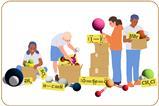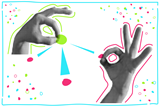Argumentation helps students develop key skills

It’s important our education systems equip young people with the skills to critique conflicting evidence from different sources. Critical thinking ensures students are able to make sound decisions and have constructive conversations and relationships.
Science lessons are an ideal opportunity to develop these skills, with many relevant contexts for students to examine evidence and make judgements based on their analysis. Research has suggested that engaging students in scientific argumentation promotes understanding of concepts and scientific method.
Now, researchers in Turkey have investigated strategies used by teachers to integrate argumentation into their teaching.
Argument construction
Argumentation involves a discussion that progresses as arguments are constructed. These arguments can be developed by individuals or by the group. They are then evaluated in the light of evidence, alternative views, justifications and rebuttals.
An argument is made up of a claim (eg an answer to a question), supporting data and a justification (how the evidence supports the claim). In the classroom, students need to bring these components together to debate with peers and critique other arguments. Scientists often do this in their work.
Although we know students can benefit from argumentation, there are pitfalls. Success will depend on effective lesson planning and classroom management.
Argumentation as a classroom activity is not something teachers usually encounter during initial training. There is scope for providing better support to encourage its application in teaching.
The researchers investigated the strategies used by seven teachers in planning and delivering argumentation-based lessons. Video recordings of the lessons and the lesson plans were analysed. The analysis focused on identifying interactions that supported argumentation among the students.
Instructional strategies
They classified the strategies into three categories: basic instructional strategies; meta-level instructional strategies; and meta-strategic instructional strategies.
Basic strategies largely involve direct interactions with students to support argumentation, eg challenging the accuracy of an argument or playing devil’s advocate.
Meta-level strategies involve practices that promote higher-order thinking, eg defining assessment criteria for students to use in evaluating arguments.
Meta-strategic instructional strategies involve teaching students about the thought processes they might apply in developing and critiquing arguments. This might involve guiding students through these processes or modelling appropriate thinking strategies.
The researchers did not probe the impact of these teaching strategies on students’ argumentation – which is something future research might look at. Also, the teachers involved in the study are not representative of teachers in general, since they are graduate students with fairly unique experiences.
Nonetheless, the strategies are valuable to teachers wanting to incorporate argumentation into their lessons, and to teacher trainers supporting new teachers in managing this kind of discourse in their classrooms.
The same skills that students develop for argumentation also support students in evaluating conclusions and judging the quality of their answers to complex problems. Such higher-order skills are not only vital in supporting lifelong learning, but they have tangible benefits for students at crucial stages in their education.
Apply it in your classroom
You can incorporate argumentation into lessons with students at any age, and it’s never too early to start arguing. While certain topics undoubtedly lend themselves to argumentation – eg ‘Is human activity responsible for climate change?’ or ‘Should the use of antibiotics in farming be banned?’ – many science lessons will have aspects that lend themselves to argumentation.
Even when you can’t build a whole lesson around argumentation because of time constraints, you can present students with a pre-formulated argument to critique. This will support the development of the skills needed for debating at a later stage.
Teaching tips
- Ask students to elaborate on their proposals and to justify them using appropriate evidence. Direct students to consider specific evidence where required.
- Encourage students to consider alternative positions and promote further argumentation.
- Challenge the correctness of students’ assertions, particularly where they misuse concepts, by rephrasing questions and posing them to other groups.
- Broaden the discussion by anticipating counterarguments and prompting students to formulate them themselves. Play devil’s advocate by proposing counterarguments.
- Make it clear to students they are allowed to change their minds.
- Support debate by modelling the thought processes required. This could involve providing a writing frame or specific step-by-step methods for constructing and evaluating arguments.
There are some useful classroom debate resources on the I’m a scientist get me out of here website.
References
Y O Yilmaz et al, Int. J. Sci. Ed., 2017, 39, 1443 (DOI: 10.1080/09500693.2017.1336807)














1 Reader's comment